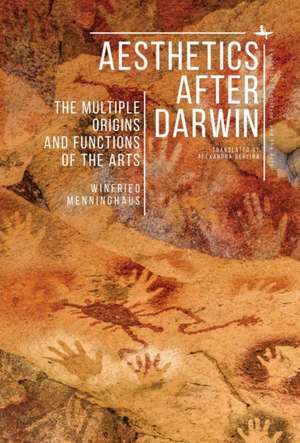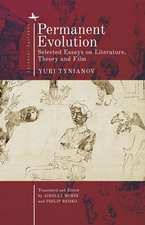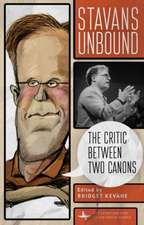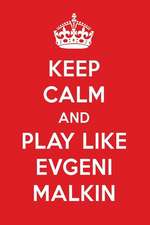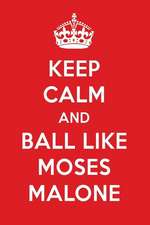Aesthetics after Darwin: Evolution, Cognition, and the Arts
Autor Winfried Menninghausen Limba Engleză Paperback – 18 mai 2021
The book also discusses how the three most discussed hypothetical functions of the human arts--competition for attention and (loving) acceptance, social cooperation, and self-enhancement--are not mutually exclusive, but can well be conceived of as different aspects of the same processes of producing and responding to the arts.
Finally, reviewing the current state of archeological findings, the book advocates a new hypothesis on the multiple origins of the human arts, posing that they arose as new variants of human behavior, when three ancient and largely independent adaptions--sensory and sexual selection-driven biases regarding visual and auditory beauty, play behavior, and technology--joined forces with, and were transformed by, the human capacities for symbolic cognition and language.
| Toate formatele și edițiile | Preț | Express |
|---|---|---|
| Paperback (1) | 257.15 lei 6-8 săpt. | |
| Academic Studies Press – 18 mai 2021 | 257.15 lei 6-8 săpt. | |
| Hardback (1) | 694.58 lei 6-8 săpt. | |
| Academic Studies Press – 2 aug 2019 | 694.58 lei 6-8 săpt. |
Preț: 257.15 lei
Nou
Puncte Express: 386
Preț estimativ în valută:
49.20€ • 51.37$ • 40.72£
49.20€ • 51.37$ • 40.72£
Carte tipărită la comandă
Livrare economică 05-19 aprilie
Preluare comenzi: 021 569.72.76
Specificații
ISBN-13: 9781644696101
ISBN-10: 164469610X
Pagini: 176
Dimensiuni: 156 x 234 x 10 mm
Greutate: 0.28 kg
Editura: Academic Studies Press
Seria Evolution, Cognition, and the Arts
ISBN-10: 164469610X
Pagini: 176
Dimensiuni: 156 x 234 x 10 mm
Greutate: 0.28 kg
Editura: Academic Studies Press
Seria Evolution, Cognition, and the Arts
Notă biografică
Winfried Menninghaus is Director of the Department of Language and Literature at the Max Planck Institute for Empirical Aesthetics (Frankfurt) and Member of the Berlin-Brandenburg Academy of Sciences. His empirical, evolutionary, and philosophical work on aesthetics has a special focus on the nature and the emotional effects of poetic language.
Descriere
Descriere de la o altă ediție sau format:
Darwin famously proposed that sexual competition is the driving force of ""art"" production not only in animals, but also in humans. This book reveals that Darwin's hypothesis, rather than amounting to a full-blown antidote to the humanist tradition, is actually informed by classical rhetoric and by English and German philosophical aesthetics.
Darwin famously proposed that sexual competition is the driving force of ""art"" production not only in animals, but also in humans. This book reveals that Darwin's hypothesis, rather than amounting to a full-blown antidote to the humanist tradition, is actually informed by classical rhetoric and by English and German philosophical aesthetics.
